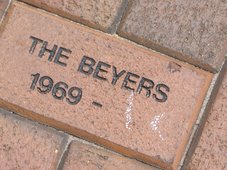Wednesday, October 28, 2009
Smart Meters Heading Our Way
The Sun says BG&E received a $200 million grant from the Obama Administration to help buy smart meters to help people manage their electricity and natural gas use.
Here's how the utility described the effort over the summer when it applied for the grant:
The first phase of BGE's Smart Grid proposal would be the installation of 2 million advanced, or "smart," electric and gas meters, operating through a robust utility-to-customer, two-way communications network, which forms the foundation for an automated, digital intelligent grid. The utility is also planning to roll out a new Smart Energy Pricing (SEP) program as its standard rate schedule, which would pay customers rebates for reducing power consumption during peak periods. In the pilot of advanced metering technology and Smart Energy Pricing, participating residential customers reduced their consumption during peak periods by 26 percent to 37 percent, saved more than $100 on average and gave the program a 93 percent satisfaction rating.
BGE's ability to rapidly and most cost-effectively carry out the Smart Grid initiative depends upon PSC approval and cost recovery in a timeframe that would allow the utility to qualify for a competitive Department of Energy (DOE) grant of up to $200 million to partially fund the initiative. BGE anticipates filing its DOE grant application in early August 2009, and it is anticipated that DOE would begin announcing grant awards in October 2009. The utility estimates initial deployment and operating costs of nearly $500 million over five years, and expects that over the project's lifecycle customer savings will exceed costs by a ratio of more than 3 to 1.
Under the cost recovery mechanism proposed by BGE, the monthly customer surcharge would be 38 cents per month for electric-only customers and 44 cents per month for gas-only customers in the first year of implementation, and the customer cost would increase slightly over time as benefits also ramp up. Over the life of the program, the monthly surcharge would average approximately $1.24 and $1.52, respectively, for residential electric and gas customers, and would be reduced based on the award of a DOE grant. Customer savings from reduced energy and operating costs will be several times greater than the amount of the surcharge.
Here's how the utility described the effort over the summer when it applied for the grant:
The first phase of BGE's Smart Grid proposal would be the installation of 2 million advanced, or "smart," electric and gas meters, operating through a robust utility-to-customer, two-way communications network, which forms the foundation for an automated, digital intelligent grid. The utility is also planning to roll out a new Smart Energy Pricing (SEP) program as its standard rate schedule, which would pay customers rebates for reducing power consumption during peak periods. In the pilot of advanced metering technology and Smart Energy Pricing, participating residential customers reduced their consumption during peak periods by 26 percent to 37 percent, saved more than $100 on average and gave the program a 93 percent satisfaction rating.
BGE's ability to rapidly and most cost-effectively carry out the Smart Grid initiative depends upon PSC approval and cost recovery in a timeframe that would allow the utility to qualify for a competitive Department of Energy (DOE) grant of up to $200 million to partially fund the initiative. BGE anticipates filing its DOE grant application in early August 2009, and it is anticipated that DOE would begin announcing grant awards in October 2009. The utility estimates initial deployment and operating costs of nearly $500 million over five years, and expects that over the project's lifecycle customer savings will exceed costs by a ratio of more than 3 to 1.
Under the cost recovery mechanism proposed by BGE, the monthly customer surcharge would be 38 cents per month for electric-only customers and 44 cents per month for gas-only customers in the first year of implementation, and the customer cost would increase slightly over time as benefits also ramp up. Over the life of the program, the monthly surcharge would average approximately $1.24 and $1.52, respectively, for residential electric and gas customers, and would be reduced based on the award of a DOE grant. Customer savings from reduced energy and operating costs will be several times greater than the amount of the surcharge.
Subscribe to:
Post Comments (Atom)





No comments:
Post a Comment